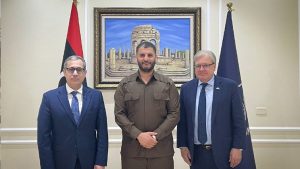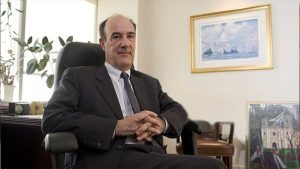News of preparations for a mini-security summit in France to form joint military units in Libya under US-British supervision has raised a number of indications about Washington’s handling of the Libyan file.
This step comes in light of accelerated US moves and meetings held by US diplomats in Libya with the aim of preparing for the elections, which are still stalled, which draws a pivotal question about Washington’s strategic objectives and the mechanism for dealing with the Libyan file in light of developments related to North Africa in general, where the US military presence seems besieged by many transformations, and by positions that seek to reduce American influence along the African coast.
A security framework for the crisis
The French website “Africa Intelligence” pointed out that the security summit in France is trying to focus on securing the Libyan borders, which are under the control of tribal factions in the west and south and the forces of General Khalifa Haftar in the east, through the formation of joint military units in cooperation with the Libyan chiefs of general staff in the east and west, in addition to officers from the Joint Military Committee “5 + 5”, and these measures aim to unify the Libyan army and develop disarmament and reintegration programs for armed groups.

In practice, thinking about the Libyan issue in terms of the security context that the Paris Summit could provide, if held, raises two basic issues:
The first is related to the security of the “political solution” and the issue of elections, especially since the proposal for a summit in Paris comes in the context of parallel measures by the US administration, where the American paramilitary company “Amentum” is training armed groups affiliated with the Government of National Unity in Tripoli with the aim of integrating these elements within the framework of a unified regular army.
It is clear that the security of the Libyan political processes will help Washington to pressure some political parties and establish various alliances targeting the centers of power in Libya, regardless of the legitimacy that will appear as a result of the elections, as the Western movement in general is trying to pre-empt the electoral process, especially since it is still not guaranteed results, and competition in it has not yet drawn a clear Libyan political map.
The second issue is related to creating “political fears” on all parties before preparing for the elections, making the Libyan crisis within a security context that suggests the possibility of confrontation with regional or even local parties, and although the strategic form of such a matter shows fears of Russian influence, but at the Libyan local level it will create a state of tension towards unclear risks.
Western fears are clear in this step, as it is a direct confrontation of the Russian influence in eastern Libya, which according to the American perception spreads to other African countries, but these fears reflect negatively on the Libyan reality, and draw various repercussions that enhance the political division in a way that does not help stability and achieve elections in a transparent and fair manner.

American Moves
The security context of the Libyan crisis is drawn against a political background embodied by the move of US Ambassador Richard Norland, as his multiple field visits enhance Washington’s orientation to draw political features for the electoral process, as there is a political path that is not limited to the usual special role of any ambassador in accordance with international protocols, but goes beyond it towards arranging internal details, and Norland’s move presents three basic issues:
The first issue is the influence on less complex political processes, and this issue is reflected in his meetings with local leaders, such as his meeting with the mayor of Misrata, Mahmoud al-Sqotri, and expressing his support for the municipal elections.
The second issue revolves around the U.S. ambassador’s attempt to establish key focal points by dealing with the details related to the internal Libyan event, and this topic is clearly illustrated by focusing on economic sub-topics, his visit to the Misrata Free Zone, or his meeting with Farhat bin Qadara, the head of the Libyan Oil Corporation, to discuss strengthening bilateral relations in the energy sector, including renewable energy.
The third issue concerns the special legitimization of his movements outside the framework of the official functioning of the Libyan government, where he meets with al-Shabab, representatives of the reconciliation committee between Tawergha and Misrata, and holds meetings with delegates from various Libyan regions, including Tripoli, to discuss ways to protect Libya’s sovereignty in light of regional turmoil.
Norland’s moves present the American perceptions that govern its strategy towards a political solution, as the American moves beyond political legitimacy in Libya, and works to establish focal points within all Libyan institutions, and at the level of social formations.

For Washington, Libya’s electoral processes are ultimately a measure through which its influence can be embodied, especially in light of the search to “confront” what Washington calls Russian activity in Libya, and this is evident in the warnings of the former US envoy to Libya, Jonathan Weiner, of Russia’s intentions to establish a naval base on the eastern Libyan coast.
The political process in Libya appears within the framework of the new American orientation as a confrontation at the African level, as it is not just a consecration of a new legitimacy in “post-war Libya”, but rather the establishment of an American perception of all aspects of Libyan activities, and the introduction of an international front in North Africa to compensate for the new positions of some African countries towards Washington.
Written by Mazen Bilal
A Military, security, and social forces supporting Saif al-Islam Gaddafi’s candidacy for the presidency of Libya
